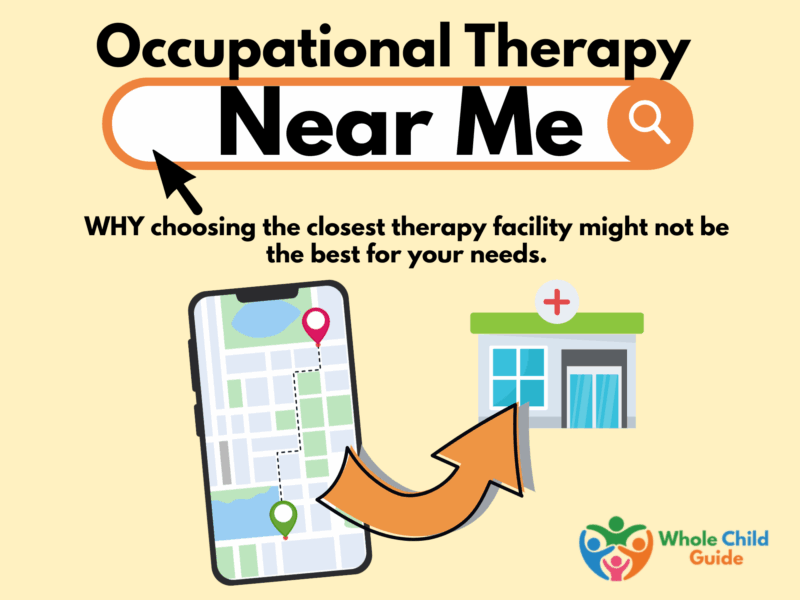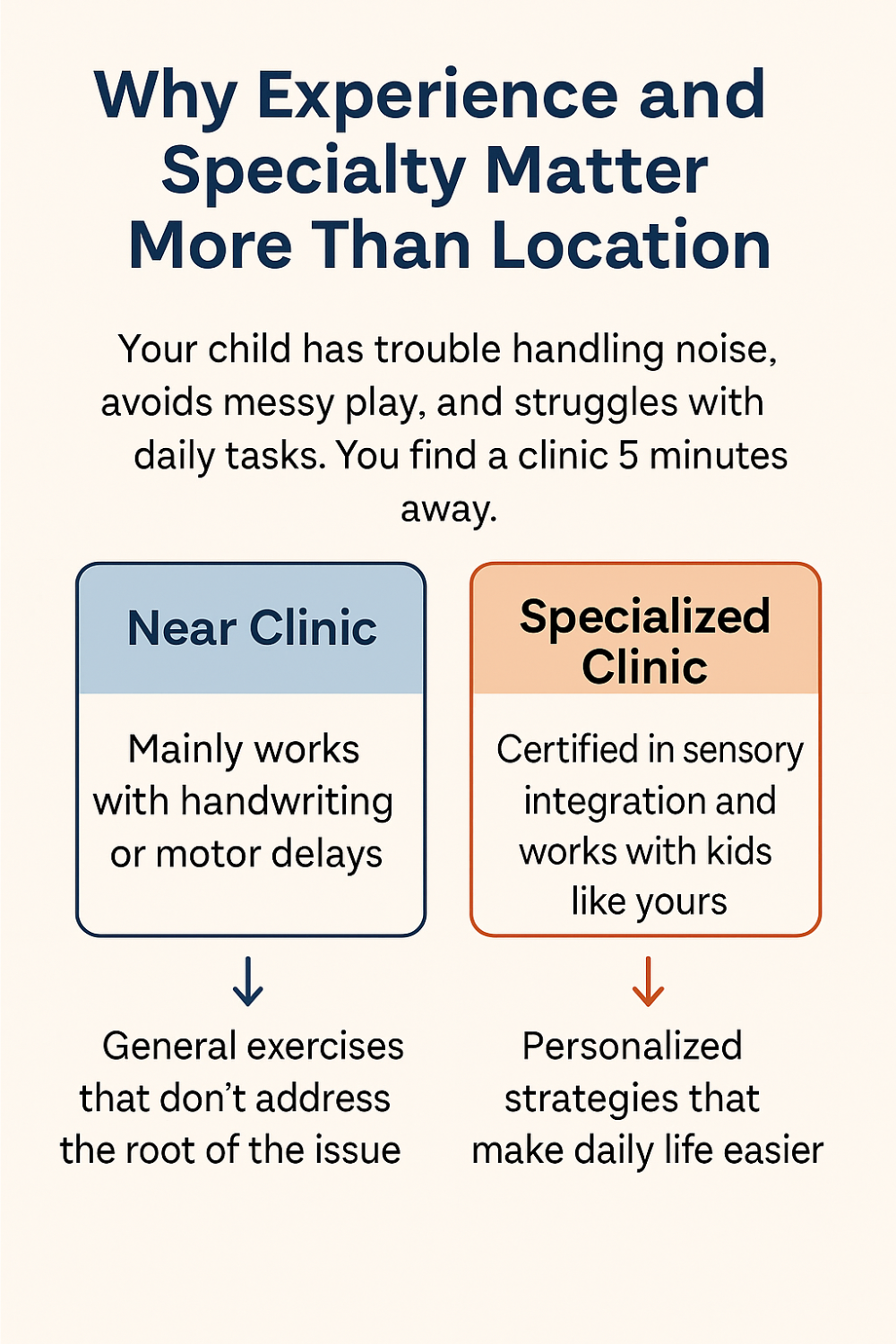
When you’re worried about your child’s development, one of the first things you might type into your internet browser is “occupational therapy near me.” It feels like the right first step, but here’s the thing: just because a clinic is nearby or ranks high on the search results doesn’t mean it’s the best fit for your child’s unique needs.
Occupational therapists, and all child specialists (PT, ST, mental health therapists, etc.) vary widely in their training, certifications, and specialties. One might focus on sensory processing, while another is trained in feeding therapy or handwriting support. Yet most local searches don’t highlight these differences, only the facility’s distance to your current location.
Even if you enter into a search bar, “Occupational therapy”, most likely the text that populates is “occupational therapy near me” in an attempt to complete your search.

The problem with this is that the results that show up may not be based on expertise or even availability of therapy professionals in that facility or therapy clinic. What you are served with in this type of search is results that are based on paid rankings. This means that clinics pay to have their locations served first.
What Is Occupational Therapy for Kids?
Occupational therapy (OT) helps children develop the skills they need to succeed in everyday life. These are things like playing, writing, getting dressed, paying attention, or managing big emotions. If you’ve noticed your child struggling with motor skills, sensory sensitivities, attention, or independence, OT can help uncover the why behind those challenges and offer hands-on strategies to support growth. Occupational Therapy is about helping kids feel more confident and capable in their daily routines.
Occupational therapy providers support a huge variety of needs in all ages, from birth to geriatrics. When we talk about pediatric occupational therapy, the specific areas of intervention vary depending on what the child needs.
Occupational therapy (OT) can help with a wide range of challenges children may face in their daily lives and the everyday things that they do in different environments (at home, at school, in the community, etc.). Here are some key areas where OT can make a big difference:
1. Sensory Processing
- Seeks or avoids certain sensations (e.g., crashing into things, avoiding messy play)
- Trouble staying calm in noisy or busy environments
- Difficulty handling sounds, textures, lights, or movement
2. Fine Motor Skills
- Difficulty using hands and fingers to complete tasks
- Trouble with things like buttoning shirts, cutting with scissors, or using utensils
- Weak hand strength or poor dexterity
3. Gross Motor Skills & Coordination
- Clumsy movements or frequent tripping
- Trouble with balance, posture, or catching and throwing
- Difficulty with bike riding or playground skills
4. Emotional Regulation
- Frequent meltdowns or emotional outbursts
- Difficulty transitioning between tasks or calming down after excitement
- Challenges with frustration tolerance or impulse control
5. Handwriting and Visual-Motor Integration
- Poor pencil grip or messy handwriting
- Trouble copying from the board or aligning writing on lines
- Avoidance of writing or drawing tasks
6. Activities of Daily Living (ADLs)
- Struggles with dressing, grooming, feeding, or using the bathroom independently
- Challenges with routines like brushing teeth or getting ready for school
7. Executive Functioning Skills
- Trouble with planning, organizing, remembering, or completing tasks
- Difficulty following multi-step directions
- Inconsistent attention or focus
Why “Near Me” Isn’t Always the Best Fit
You might have noticed that when you Google something like “occupational therapy near me,” the results you see aren’t just a list of the best therapists in your city, they’re mostly a list of the closest ones and the ones that are paying to show up first. It’s the biggest hospital facilities, and the same ones over and over again, no matter how often you try this search. This happens with all search engines, Bing, Yahoo, etc.
These search engines use your location to pull up nearby clinics and occupational therapy facilities. That’s great for convenience! You don’t need to know about a wonderful therapy clinic three states over. But here’s the thing: not all nearby therapists have the right training for your child’s specific needs.
That’s because occupational therapists can have a huge variety of specialties, clinical experiences, certifications, and skills in the specific areas that match your child’s needs.
On top of that, some businesses pay to appear higher in search results. That means the ones you see first may just have a bigger marketing budget, not better experience.
The thing to remember is that while this feature of the internet is incredibly helpful, it might not be a personalized recommendation.
That’s exactly why we created the Whole Child Guide! It’s a tool to help you look beyond the map and find local professionals who actually specialize in the kinds of challenges your child is facing.
Here’s an example of what we mean by this: Let’s say your 5-year-old has trouble staying calm in noisy places, avoids messy play, and struggles with everyday tasks like getting dressed. You Google “occupational therapy near me” and find a clinic just five minutes away. That’s convenient, right?
But here’s the thing: that clinic mostly works with kids who have handwriting issues or motor delays, not sensory processing challenges.
Meanwhile, there’s another therapist 25 minutes away who’s certified in sensory integration, has worked with hundreds of kids just like yours, and offers parent coaching as part of the therapy.
The difference?
- At the nearby clinic, your child might go through general exercises that don’t really address the root of the issue.
- At the specialized clinic, your child gets personalized strategies that make daily life feel easier for both you and your child.
In the end, driving a little farther can mean faster progress, fewer meltdowns, and a happier, more confident child.
Not All OTs Are the Same
Did you know that there are a wide range of OT certifications and specialties? Different therapy professionals have different experience supporting specific populations (autism, ADHD, etc.). Those different experiences and clinical specialties matter!
Let’s take a look at all of the various specialty certifications there are for Pediatric OTs and OTAs.
Sensory Integration & Regulation
- SIPT Certification (Sensory Integration and Praxis Tests)
- STAR Institute Advanced Mentorship in Sensory Integration
- Integrated Listening Systems (iLs) / Safe and Sound Protocol (SSP)
Feeding & Oral Motor
- SOS Approach to Feeding Certification
- Beckman Oral Motor Protocol
- Talk Tools Oral Placement Therapy Training
Emotional Regulation & Social Engagement
- DIR/Floortime Certification
- Zones of Regulation® Training
- Social Thinking® Provider Training
Fine Motor & Handwriting
- Handwriting Without Tears® Certification
- Size Matters Handwriting Program (SMHP) Training
- Print Tool® Certification (through Handwriting Without Tears)
Executive Function & ADHD Support
- CO-OP Approach (Cognitive Orientation to Occupational Performance)
- Executive Function Coaching Certification
- Alert Program® for Self-Regulation Training
Autism & Neurodiversity
- Autism Certificate (IBCCES)
- Certified Autism Specialist (CAS)
- Pivotal Response Treatment (PRT) Training
Developmental Delays & Neurological Conditions
- Neurodevelopmental Treatment (NDT) Certification
- Cerebral Palsy Foundation OT Training
- Brain Gym® Certification
Behavioral & Trauma-Informed Approaches
- Therapeutic Listening®
- Trauma-Informed Care Training
Trust-Based Relational Intervention (TBRI®) Training
This list just scratches the surface when it comes to knowledge and experience that pediatric occupational therapy professionals can have!
How to Use a Directory Like Whole Child Guide
Unlike a typical internet search that shows you the closest clinics first, Whole Child Guide is designed to help you find the right professional based on what skills your child needs help with, the diagnosis they may have, and other specifics that will help them. It’s not just a list of the nearest clinic or facility.
Our directory lets you filter by specialty, experience, and location, and other filters so you can match with someone who truly understands your child’s specific needs. Whether you’re looking for a therapist certified in sensory integration, feeding therapy, or handwriting support, you can browse detailed profiles, read about each provider’s background, and reach out with questions.
Then, we can offer suggestions for other professionals that can support your child’s needs and find those clinicians that are local to you as well. We’re filling in the gaps to connect you to the right support for the “whole child”.
Finding the RIGHT Occupational Therapy Provider Near Me
I hope this helps you to recognize that it’s completely okay (and often exactly what your child needs) to look beyond your ZIP code when choosing an occupational therapist. The right fit can lead to faster progress, fewer frustrations, and a more confident child. That’s why we created Whole Child Guide, to make it easier for parents to find professionals who aren’t just nearby, but truly qualified to support your child’s unique challenges.
We’re here to guide you through the process, whether you’re seeking support for sensory challenges, handwriting struggles, emotional regulation, or everyday routines.
[Browse the Whole Child Guide Directory].
“
